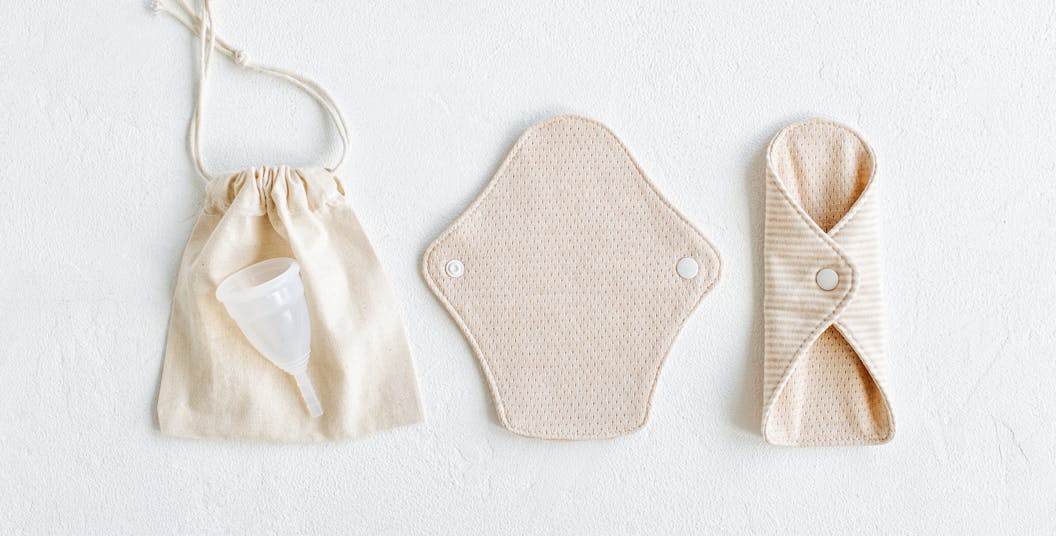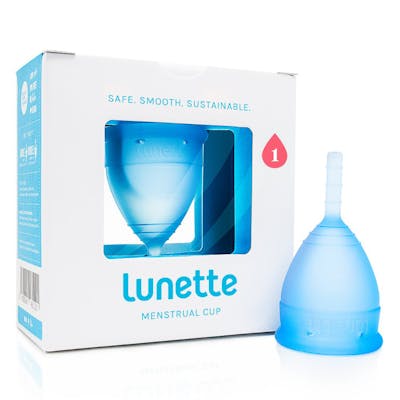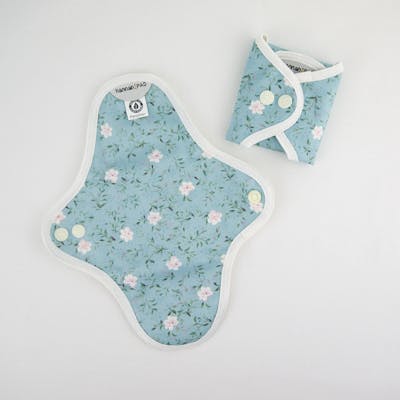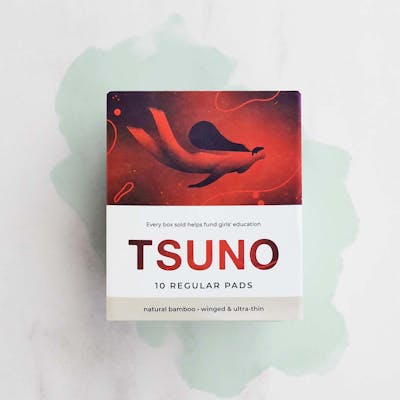
It’s easy to feel overwhelmed when you consider the plastic and pollutants currently overflowing in our modern world.
But it helps to remember that there’s a whole new generation of environmentally aware, passionate and kind humans who are dedicated to making change.
Sound like anyone you know?
And we’ve had some wins. Single-use plastic has been in the firing line, and there’s now a social stigma around using straws, takeaway coffee cups and single-use plastic bags.
So it’s time to turn our attention to another plastic polluter.
Period products.
The environmental effect of modern-day periods
The vast majority of period products you find stocked on your local store’s shelves these days are plastic-based or packaged in plastic. Designed to be convenient and cheap, these products served their purpose for women at a moment in time.
But now there are plenty of equally valuable products - without the waste.
It’s estimated that each woman will use approximately 11,000 sanitary products in their lifetime, which equals 150kg of waste - including packaging.
These plastic-based products take 450 years to decompose sitting in landfills and when incinerated release greenhouse gases into our atmosphere.
Modern period products are considered essential and there are often no regulations around declaring the materials that are used to make them. In Australia, this is due to these products being listed as medical devices under the Therapeutic Goods Administration (TGA). This means that chemicals, bleaches and microplastics may go undetected from our period products through to our bodies and our environment.
Lessons from the past
Menstruation has always been a part of human history. Periods are as natural as it gets and women through the centuries have used various different methods to handle their flow.
The drive to keep moving, working and active during menstruation has always been there for women, who’ve used wool, cotton, rags, grass and fur for their periods over history, just to name a few!
In fact, one of the earliest recorded menstrual pads in history dates back to the 10th century in Ancient Greece. Hypatia of Alexandria was a philosopher, teacher and inventor who allegedly threw her menstrual rags at a misogynist admirer. Pretty relatable!
Historically, periods tended to be eco-friendly, with products throughout the years being naturally reusable or biodegradable in their nature. For thousands of years, menstruation was met with natural dealings and remedies.
So what happened?
As society progressed periods became shrouded in shame, with women made to feel their bodily functions were something to hide, stifle and not discuss. Industries seized this opportunity to take charge of women’s bodies and manipulate how we manage them.
The first commercially produced sanitary products emerged in 1888 and since then industries have profited from our periods, pedalling unsustainable products as vital and necessary, and in the process hurtling millions of pounds of waste into the ecosystem.
Waste is often cited as a defining feature of modern life. But we think it's time to challenge the practices and products that have become ingrained in our day-to-day lives. It’s time to create a new normal and a dawn of a new modern society.
Eco-friendly period products
There are kinder alternatives available. We can reject waste and choose eco-friendly period products, shaking off stigma and taking back control of our bodies as we do so.
Here are some of our eco-friendly period options.
Period underwear
Period underwear is an extremely comfortable choice for managing your period. With the latest fabric technology, this specially designed underwear offers maximum absorbency while still maintaining a sleek and discreet fit.
Period underwear looks like normal underwear, but it uses extra layers of fabric to absorb moisture and wick it away from your skin, preventing any leakages. This means you can wear it during your period without also needing to wear a tampon, pad or menstrual cup.
The benefit of period underwear is that it comes in all sorts of styles and shapes. There are options for most body types and levels of absorbency, so no matter your needs you should be able to find a pair that works for you.
Menstrual cups
Menstrual cups provide you with all the benefits of a tampon without the addition of waste.
Menstrual cups are made from medical-grade silicone and hold up to three times as much fluid as a regular tampon. Menstrual cups collect menstrual blood, rather than absorbing it, which means they pose no risk of toxic shock syndrome to users.
If you care for your cup it will care for you - for up to 10 years! These durable products will save you money for years to come.
You also have the benefit of knowing exactly what you’re putting into your body. Regular tampons, by contrast, can be made from plastics and other synthetic products - tampons are classed as medical devices in Australia and New Zealand, so they’re exempt from labelling laws. This means we don’t know exactly what’s in them!

Menstrual cup from Lunette is sustainable and long-lasting
Made from medical-grade silicone and capable of holding up to three times as much fluid as a regular tampon.
Look after it, keep it clean and it will last for many years. Once it's no longer fit for purpose, Lunette recommend you just burn it!
Cleaning your menstrual cup
Investing in a good menstrual cup cleaner can help make using your reusable menstrual cups more manageable than ever. A cup cleanser can make cleaning your cup a breeze!
It’s best to look for a cleaning product that is sulphate-free, paraben-free and packed full of natural ingredients to keep your body in harmony and extend the life of your menstrual cup.
We recommend using Dr Bronner's liquid castile soap. You only need a tiny drop, mixed with water, to give your cup a deep clean so it will last you for many cycles.
You can also simply rinse out your cup with water between uses and boil it in water for sanitisation between cycles - before and after each period will ensure it is perfectly clean and safe to use.
Cloth Pads
Cloth pads are an excellent choice for those who want a convenient, discreet and reusable period product.
These cloth pads are a far stretch from the historic period cloths, with modern pads designed to contour to your body to provide comfortable and secure protection. Not to mention cleaning your reusable pads is unbelievably easy - just give them a rinse out and pop them into your regular cycle of laundry.

Pads & liners suitable to your needs from Hannahpad
Cloth pads come in all sorts of shapes, sizes and absorbency levels so you can find the type that fits you best.
One of our favourites is Hannahpad’s cloth pads with silicone grips on the back to prevent them from slipping around.
Organic Disposable Pads
The majority of the disposable maxi pads in your local stores are made up of 90% plastic. These pads are often fragranced with over 3000 chemicals!
If you’re not quite ready to make the jump to reusable products or want a handy alternative for travel or outings, choosing biodegradable disposables can help you face the challenges of reducing waste.
Organic pads will not only be more gentle on your body at its most vulnerable time, but they also take only 90 days to decompose once thrown out. A far cry from the 450 years that it takes regular synthetic pads.

Made from cotton and bamboo, try our favourite brands
Making it easier for you to switch your period products to a kinder alternative, Natracare and Tsuno offer a full range of sanitary products made sustainably from bamboo and cotton.
Plastic-free and made from plant-based materials that break down in the soil in a short space of time.
Dealing with dirty laundry
When we think of period waste, we mostly imagine piles of plastic stacked up in landfills but the lesser-known side is not so easily seen - in your dirty laundry.
Conventional laundry products you may use to clean your cloth pads, liners and period undies often contain environmentally destructive surfactants. It’s bad for fish in particular. Chemical surfactants are used to lift stains from laundry, but when entering our waterways, can actually break down the mucus layer of the fish that are exposed to them. The surface tension of the contaminated water is reduced, leaving fish vulnerable, making it easier for them to absorb pollutants!
When choosing a laundry product that suits your period products it’s also important that they do not contain chemicals that will interfere with your bacterial balance or irritate sensitive skin. Go for a natural, plant-based laundry detergent. Some eco-friendly laundry products designed for cloth pads actually contain probiotics to support a healthy bacteria balance instead of disrupting it!
When looking to remove some of those (sometimes inevitable) period stains then look no further than chemical-free, plant-based stain removers. We recommend Hannahpad’s Probiotic Laundry Soap or the Lemon Myrtle Laundry Sticks from That Red House. Despite being natural, the products are still very effective!
Emotional management
Getting your flow managed naturally is just part of the monthly joys. Periods can also bring stress, pain and discomfort. Both your body and mind may need some TLC to stay zen through the rollercoaster that is the menstrual cycle.
You can feel good in your choices by taking a natural route to your care. Lavender oil is a godsend for the discomfort caused by cramps due to its scientifically proven anti-inflammatory properties.
Not only that but it can also be a great tool to help ease anxiety, stress, headaches and help you sleep!
You can also take an all-natural route to battling aches and pains by utilising organic heat packs (easily made at home from fabric and rice!) and indulging in some herbal teas to ease cramps and reduce bloating.
It's also often said that getting out and exercising will help with period pains, but let’s face it - nobody really wants to do that! Some gentle stretching outside in the sunlight is a lot more achievable than going jogging and will provide the same benefits.
Your choices make a difference
In this day and age, it seems like everything you do can be bad for the environment. It can be demoralising! But every positive choice you make, no matter how small, contributes to a better world.
Switching to kinder alternatives can save the planet and not to mention save you money in the long run.
It can feel overwhelming with all your choices when it comes to dealing with your period. It’s important to remember that you don’t have to use every product out there or go all in. You can ease your way into eco-friendly products and find what works for you.
Moving towards eco-friendly living is a journey. Everybody (and everybody's body) is different and there is something for everyone and every flow.
Your period is natural and it can stay that way!